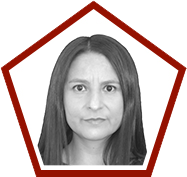Dª Fernanda Pacheco

Dª Fernanda Pacheco
Biodata
Researcher and PhD student in Cognitive Science and language in the Faculty of Psychology at University of Barcelona. After getting a Master in Communication at University of Palermo (Argentina), she worked as a lecturer, researcher and editor of scientific-academic articles at several universities in Argentina and Ecuador from 2005 until 2014. Moreover, she was the Academic Director in the Degree of Advertising and Management at UTE in Ecuador. She worked as a specialist and editor in Educational Research Management at INEVAL of Ministry of Education (Ecuador), focusing on the development of socio-educational researches. She is currently a PhD researcher in Autism spectrum disorder, Bilingualism and Technology, of the Research group GRECIL at Universitat de Barcelona and Universitat Oberta de Catalunya (Spain). She also collaborates as a researcher in the Project ““El aprendizaje implícito en niños con Trastorno Especifico del Lenguaje mediante el registro de movimientos oculares” R721E_EDU2016-75368-P. She is a member of the group RecerTEL, dedicated to the transference of research to the society, giving advice and training to parents and professionals about the Specific Language Impairment. In 2017, she did a research stay in FILIUS Institute at University of Puerto Rico, which is specialized in Autism spectrum disorder.
Uso y preferencia de lengua en niños (entre 6 y 12 años) bilingües con Trastorno del Espectro Autista
Children with Autism spectrum disorder (ASD) have problems to process complex information in the language [1]. Bilingual children with ASD prefer the use of a second language (L2) instead of their mother tongue (L1) in daily activities [2]. The objective of this work is to analyse the use and preference of the L1 (Spanish) and L2 (English) in bilingual children with ASD through a task of naming words with different levels of difficulty. The sample was composed by children between 6 and 12 years old diagnosed with mild ASD (n=14) and a control group with children of typical development (n=14), paired by age, gender and language exposition. The results showed that when there is more difficulty, ASD children make more mistakes than the control groups; regarding preference of language, control groups have greater preference for L1.